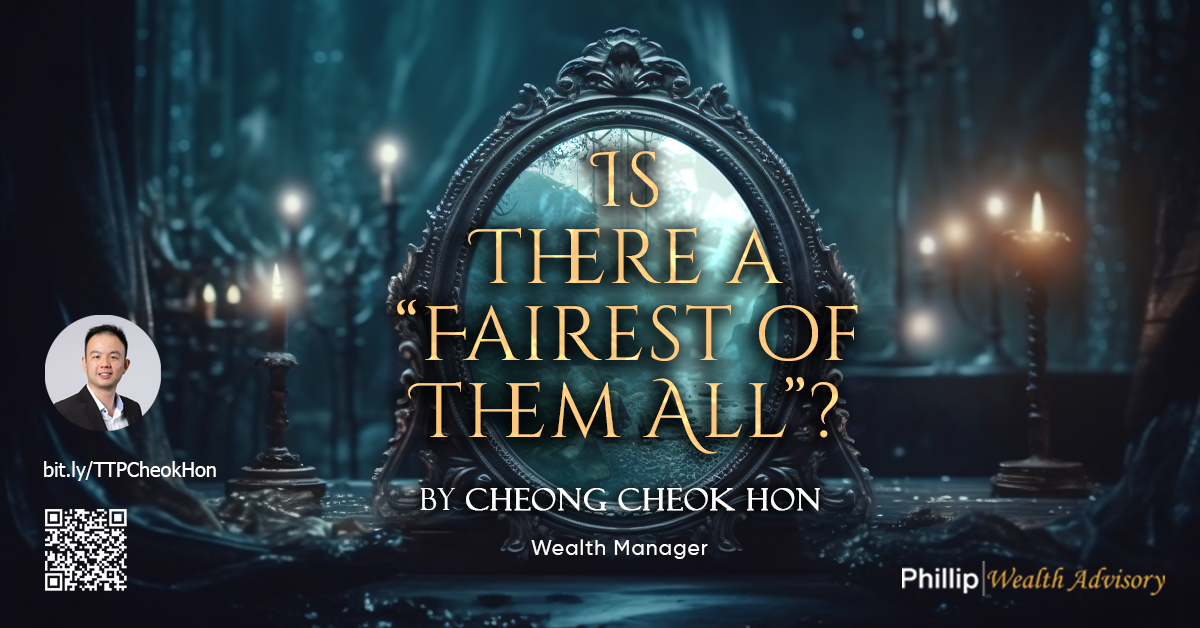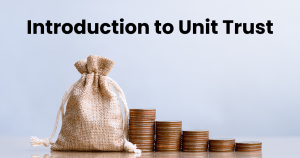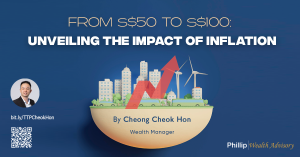Is There a “Fairest of Them All”? October 3, 2023

In a world consumed by constant struggles and the unyielding demands of responsibilities such as family and work, the critical task of financial planning is often overlooked. Yet, the need for financial planning is now even more pressing in the face of a challenging current global economy wrought by political conflicts, inflation and high costs. As the proliferation of ideas, opinions, options and complex-sounding jargon out there can lead to information overload, the quest for a truly optimal wealth management solution remains. In this article, we’ll cut through the noise to explore the various wealth management strategies available in Singapore and uncover whether there is, in fact, a ‘fairest of them all.’
Savings Accounts, FDs, Money Market Funds, SSBs and T-Bills – these are typically shorter-term instruments with minimal risk, currently returning 0.05% to 4%. They are excellent tools for short-term planning or for building emergency funds. While they have regained popularity as interest rates have risen in recent times, investors should also note that there might be a reinvestment risk when the invested funds mature should interest rates soften. When interest rates decline, these instruments may also underperform as capital invested in other products could provide higher returns.
Shares – Owning shares essentially means owning a portion of a company, a concept most investors are familiar with. Over the medium to long term, being invested in a reputable company can yield fair returns. For instance, DBS Group, which is publicly listed in Singapore, has delivered annualised returns of 6-10% over the medium to long term, supported by consistent net profit growth over the years. [1] However, the risks and volatility associated with publicly-traded shares can discourage potential investors, especially when their hard-earned money is at stake. For those intrigued by the prospect of discovering the market’s next standout performer, navigating a variety of methodologies such as P/E ratios, P/B ratios, DCF, gearing, growth/value/momentum, etc. can be both daunting and time consuming.
REITs, Unit Trusts and ETFs – these are collective investment schemes that hold portfolios comprising a variety assets, such as stocks, bonds, real estate or other asset classes. Typically managed by professionals, these products offer a diversified exposure to a selected asset class, sector or geography with a smaller initial investment and professional expertise. For example, investing in a corporate bond might require upwards of S$200,000 and expose the investor to the full credit risk associated with the issuer.
In contrast, a diversified bond unit trust can typically be subscribed into with a relatively small sum of S$1,000 or more, making it much more accessible for the average investor. However, investors should also be aware of the alignment of interest and expertise of the respective managers, ongoing fees associated with the management of these investment products which may potentially diminish returns in the long term, and the fact that these investments are also subject to underlying market volatility.
Property – In land-scarce Singapore, property investing is a popular consideration. It can be a good way to build long-term equity while securing a place to live. Property prices often reflect the economic fundamentals of a country, an area where Singapore has performed reasonably well. Therefore, owning property can be a crucial pillar of a long-term wealth accumulation plan. However, property investments usually require a substantial outlay, commitment of future earnings for loan repayments, and are subject to interest rate and credit cycles. They are also not as liquid as most financial products. These investments, which will likely incur interest costs, maintenance expenses, various taxes (e.g. property/stamp duties), may even attract unwanted attention from regulators.
Insurance – Insurance endowment plans in Singapore typically offer projected yields averaging around 2.5% to 4% per annum, depending on the design and term of the plan. While this may seem low to some, these plans usually come with embedded protection benefits (e.g. death, disability, retrenchment, etc.) and guaranteed capital values, unlike many other investment products. They can be useful in complementing one’s investment portfolio. Endowment plans can encourage regular saving, and the accumulated sum can be used for future financial needs such as retirement or a child’s education. Another key aspect of insurance is to provide coverage against unexpected events such as major illnesses or accidents. While it is no secret that insurers underwrite for profits, the peace of mind gained from being adequately covered can be reassuring and allow us to go about our lives with greater confidence. However, most insurance plans require a longer commitment period and may involve significant penalties for early termination. Additionally, the wide range of insurance products available can be cumbersome to sift through and understand.
As previously mentioned, each option has its pros and cons. What may seem more appealing can vary widely, depending on our individual thoughts, experiences, wants, needs, and risk profiles. Therefore, it’s prudent to consider the benefits and limitations of the various options available before making a decision, even though it is tempting to believe that a particular option is seemingly superior. In short, there may not be a “fairest of them all” solution that suits everyone. Nevertheless, I believe that we should all enjoy the psychological dividend of a well-thought-out and diversified personal financial and wealth management plan, even as we navigate the complexities of our daily lives and responsibilities.
I hope this article has been informative. Should you require a reliable partner in your personal financial journey, backed by a reputable brand such as PhillipCapital, please feel free to contact me for a chat. If you are still contemplating your next investment move, you might also consider temporarily allocating your idle funds into PhillipCapital’s SMART Park.
Reference:
Contributor:

Cheong Cheok Hon
Wealth Manager
Phillip Securities Pte Ltd (A member of PhillipCapital)
http://bit.ly/TTPCheokHon
Disclaimer
This material is provided to you for general information only and does not constitute a recommendation, an offer or solicitation to buy or sell the investment product mentioned. It does not have any regard to your specific investment objectives, financial situation or any of your particular needs.
Accordingly, no warranty whatsoever is given and not liability whatsoever is accepted for any loss arising whether directly or indirectly as a result of your acting based on this information. Investments are subject to investment risks.
The risk of loss in leveraged trading can be substantial. You may sustain losses in excess of your initial funds and may be called upon to deposit additional margin funds at short notice. If the required funds are not provided within the prescribed time, your positions may be liquidated.
The resulting deficits in your account are subject to penalty charges. The value of investments denominated in foreign currencies may diminish or increase due to changes in the rates of exchange.
You should also be aware of the commissions and finance costs involved in trading leveraged products. This product may not be suitable for clients whose investment objective is preservation of capital and/or whose risk tolerance is low.
Clients are advised to understand the nature and risks involved in margin trading. You may wish to obtain advice from a qualified financial adviser, pursuant to a separate engagement, before making a commitment to purchase any of the investment products mentioned herein. In the event that you choose not to obtain advice from a qualifies financial adviser, you should assess and consider whether the investment product is suitable for you before proceeding to invest and we do not offer any advice in this regard unless mandated to do so by way of a separate engagement.
You are advised to read the trading account Terms & Conditions and Risk Disclosure Statement (available online at www.poems.com.sg) before trading in this product. Any CFD offered is not approved or endorsed by the issuer or originator of the underlying securities and the issuer or originator is not privy to the CFD contract. This advertisement has not been reviewed by the Monetary Authority of Singapore.
About the author
Cheong Cheok Hon
Wealth Manager
Phillip Securities Pte Ltd (A member of PhillipCapital)
Cheok Hon is a Wealth Manager at Phillip Securities with extensive experience in advising on insurance and investment products. He is dedicated to using his expertise and knowledge to become a trusted partner and advisor on his clients' personal finance journey. In his free time, he enjoys reading articles related to current affairs and finance..

 How to select a unit trust
How to select a unit trust  Introduction to unit trust
Introduction to unit trust  From $50 to $100: Unveiling the Impact of Inflation
From $50 to $100: Unveiling the Impact of Inflation  Japan’s Economic Resurgence: Unveiling the Tailwinds Behind Nikkei 225’s Record Leap
Japan’s Economic Resurgence: Unveiling the Tailwinds Behind Nikkei 225’s Record Leap 









